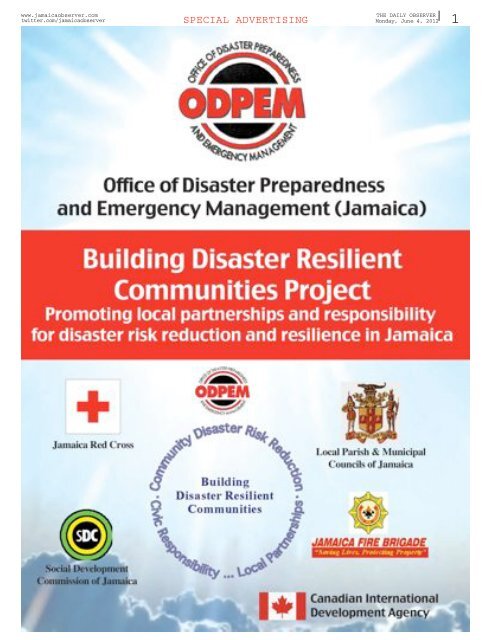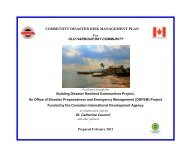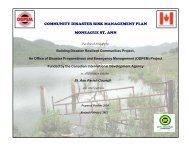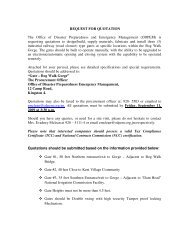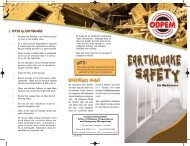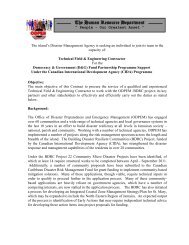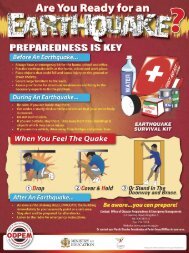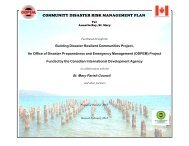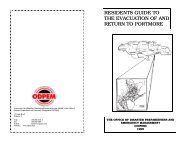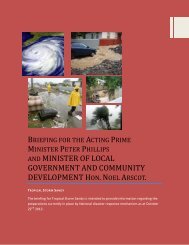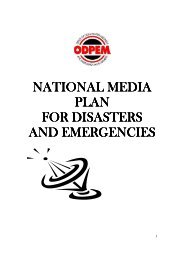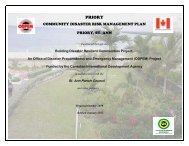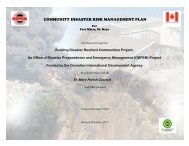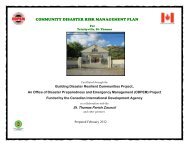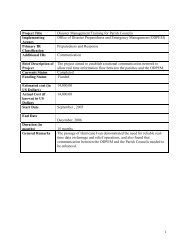View Suplement - ODPEM
View Suplement - ODPEM
View Suplement - ODPEM
Create successful ePaper yourself
Turn your PDF publications into a flip-book with our unique Google optimized e-Paper software.
www.jamaicaobserver.com<br />
twitter.com/jamaicaobserver<br />
SPECIAL ADVERTISING<br />
THE DAILY OBSERVER<br />
Monday, June 4, 2012<br />
1
2<br />
THE DAILY OBSERVER<br />
Monday, June 40, 2012<br />
Every year at this time, the Office of<br />
Disaster Preparedness and Emergency<br />
Management (<strong>ODPEM</strong>) leads the nation<br />
into fulsome focus on the need for<br />
preparedness in the event of disasters,<br />
and in particular, disasters associated<br />
with the onset of the six (6) month<br />
period of the hurricane season.<br />
While it is virtually impossible to be<br />
isolated from the ravages of disasters, or<br />
be able to precisely predict their<br />
occurrence, scale or magnitude of their<br />
impact, by engaging in proactive forward<br />
planning and preparedness, it is possible<br />
to minimise the severity of the resulting damage or loss.<br />
The theme chosen for this year’s preparedness and awareness initiative:<br />
EMBRACE CLIMATE CHANGE REALITIES ... BUILD DISASTER RESILIENT COMMUNITIES, is<br />
one that I urge all Jamaicans to fully embrace. In addition to severe weather<br />
events, climate change is increasingly being associated with impacts on: clean<br />
water supply, health of reefs, habitats of our fish stock, agricultural production,<br />
patterns of rainfall, severity of droughts, community health and sanitation, even<br />
the spread of diseases, and the overall economic and social life of the<br />
community. Climate change has an impact on the environmental sustainability of<br />
the communities where we live, and so all of us need to concern ourselves with<br />
the challenge of climate change and what we can do to build the capacity of the<br />
SPECIAL ADVERTISING<br />
MESSAGE FROM<br />
THE<br />
MOST HON. PORTIA SIMPSON MILLER<br />
PRIME MINISTER OF JAMAICA<br />
www.jamaicaobserver.com<br />
twitter.com/jamaicaobserver<br />
community to withstand and minimise its impact.<br />
To a great extent, the capacity of the community to be disaster-resilient will<br />
depend on our own actions. There are things we can do to help; from taking care<br />
of the infrastructure put in to help protect the community from damage and<br />
destruction caused by raging waters; to avoid building our homes in areas close<br />
to gullies or on land that is prone to slippage and flooding. It includes proper<br />
disposal of garbage and controlling the spread of harmful diseases. Even our<br />
risky personal behaviour and lifestyles can impact on the health and safety of our<br />
communities and thus make it less resistant to disasters.<br />
In much the same way that at the national level, Jamaica is committed to the<br />
principles of a sustainable environment, so too at the level of the community, we<br />
must do the right things so our communities can continue to serve our socioeconomic<br />
needs.<br />
While most people will not see their actions as impacting the community, it is<br />
now more important than ever to accept that everything that we do at the<br />
community level be done towards ensuring its protection and sustainability;<br />
making it disaster resilient. The community development vision must take account<br />
of climate change and environmental imperatives.<br />
I urge all Jamaicans to play their part in strengthening the capacity of their<br />
communities to be disaster resilient and ensuring that with God’s grace, our<br />
nation will have a safe year without loss of lives or damage to property due to<br />
disasters.<br />
The Most Hon. Portia Simpson Miller<br />
Prime Minister of Jamaica
www.jamaicaobserver.com<br />
twitter.com/jamaicaobserver<br />
SPECIAL ADVERTISING<br />
Message from<br />
the Leader of the Opposition<br />
Mr. Andrew Holness<br />
THE DAILY OBSERVER<br />
Monday, June 4, 2012<br />
3<br />
Jamaica is always at risk and<br />
exposed to natural disasters<br />
whether they be hurricanes or<br />
earthquakes. We have seen the<br />
disastrous consequences of these<br />
occurrences such as floods,<br />
considerable damage to<br />
infrastructure, loss of property and<br />
most tragically, loss of lives.<br />
As we approach the 2012 hurricane<br />
season, we are reminded of the<br />
constant need to ensure that the<br />
general public is provided with all<br />
information available so that they can<br />
develop the necessary awareness to<br />
make them fully prepared to face all<br />
possible dangers. In this regard, both<br />
the public and private sectors must<br />
work in concert with each other.<br />
Programmes of sensitisation are<br />
extremely necessary and must be a<br />
constant feature of our support efforts.<br />
We must exploit the benefits and<br />
effectiveness of the mass media in<br />
enlightening the public about possible<br />
catastrophes and the necessary<br />
responses. We must also remind<br />
Jamaicans of their own responsibility to<br />
take steps to avert danger and protect<br />
themselves and their properties. This is<br />
necessary because there are always<br />
threats from hazards which we create<br />
ourselves.<br />
The Office of Disaster<br />
Preparedness and Emergency<br />
Management (<strong>ODPEM</strong>), a most<br />
critical Agency, has been doing an<br />
excellent job in carrying out its<br />
mandate of disaster management<br />
since 1993. It has been very<br />
successful in reducing the impact of<br />
disasters in Jamaica. This is why we<br />
must make available all the<br />
necessary and affordable resources<br />
to support it.<br />
Andrew Holness, MP<br />
CHAIRMAN’S MESSAGE<br />
FOR DISASTER PREPAREDNESS MONTH SUPPLEMENT<br />
“There are two big forces at work, external and internal. We have very little control over the external forces such as earthquakes, hurricanes and<br />
tsunamis. What really matters is the internal forces. How do we respond to those disasters Over that we have complete control”~ Leo Buscaglia<br />
This typifies the challenges faced by the Office of Disaster Preparedness and Emergency Management (<strong>ODPEM</strong>) that functions as the nodal Agency for the<br />
application of processes to treat with the preparedness and reduction of all disasters at the national level. Traditionally, we as a people have tended to focus on the<br />
conventional disasters of hurricanes, and to a lesser extent, earthquakes. In more recent times this foci has expanded to include tsunamis. Too often we ignore at our<br />
own peril, manmade disasters that can be just as devastating (if not moreso) in some instances. Diseases, pandemics, unsafe construction practices, environmental<br />
degradation, urban conflagrations, compromised water supplies, terrorist attacks, chemically induced explosions and hazardous material transport or misuse often<br />
go under recognised as aspects of Disaster Management that are compelling of our attention.<br />
In addressing these<br />
problems, <strong>ODPEM</strong> will<br />
spearhead the creation and/or<br />
strengthening of nationally<br />
integrated Disaster Risk<br />
Management mechanisms,<br />
with designated<br />
responsibilities through to the<br />
local levels to facilitate<br />
coordination.<br />
To this end, <strong>ODPEM</strong> will<br />
vigorously pursue:<br />
Institutional, Legislative and<br />
Policy Frameworks -<br />
Building upon the pending<br />
legislative framework and<br />
already approved financial<br />
allocations for disaster<br />
response and risk reduction.<br />
Hazard, Vulnerability and<br />
Risk Assessments -<br />
Establishment of a georeferenced<br />
national database<br />
of potential disaster areas and<br />
the likely impacts.<br />
Disaster Management<br />
Systems - Lobby for disaster<br />
preparedness and response<br />
systems to be built into all<br />
government, public, private,<br />
corporate sectors and civil<br />
societies’ developmental<br />
plans.<br />
Early Warning Systems -<br />
Enhancement of our flooding,<br />
landslide and tsunami<br />
monitoring capacities.<br />
Disaster Preparedness<br />
Plans - A review of disaster<br />
preparedness plans at the<br />
parish and community levels,<br />
starting with the most<br />
vulnerable areas.<br />
Mitigation and Integration<br />
of Disaster Risk Reduction<br />
in Development Sectors - A<br />
review of mechanisms (such<br />
as mandatory risk<br />
assessments) to incorporate<br />
disaster mitigation measures<br />
in all “development” projects.<br />
Public Awareness and<br />
Education - Promulgation of<br />
public awareness and<br />
education programmes for<br />
specific disaster risks.<br />
Capacity Development -<br />
Deepening the partnerships<br />
developed with the national,<br />
regional and international<br />
institutions for capacity<br />
building support.<br />
Communication and<br />
Transportation -<br />
Development and<br />
implementation of protocols<br />
for emergency<br />
communications.<br />
National Continuity Plans -<br />
Development of a National<br />
Recovery / Continuity Plan to<br />
include more importantly the<br />
essential social and economic<br />
services.<br />
<strong>ODPEM</strong> will continue to be<br />
proactive in its approach to<br />
disaster risk management<br />
rather than being ad hoc<br />
and reactive. We recognise<br />
the respective roles of<br />
different organisations and<br />
undertake to provide<br />
support within the<br />
established framework. In<br />
collaboration with other<br />
Agencies, we will ensure<br />
appropriate and timely<br />
welfare for isolated victims<br />
of disasters Jamaicans can<br />
expect no less of this<br />
Agency.
4<br />
THE DAILY OBSERVER<br />
Monday, June 40, 2012<br />
DIRECTOR<br />
GENERAL’S MESSAGE<br />
SPECIAL ADVERTISING<br />
www.jamaicaobserver.com<br />
twitter.com/jamaicaobserver<br />
June 1 marks the start of the 2012 Atlantic<br />
Hurricane Season. However this month holds<br />
greater significance on the Annual Calendar of<br />
the Office of Disaster Preparedness and<br />
Emergency Management (<strong>ODPEM</strong>) as it is the<br />
time when the organisation seeks to focus the<br />
public’s attention on natural disasters that<br />
commonly affect us as a people. The month of<br />
activities is designed to raise awareness of<br />
hazards and their effects, highlight how to<br />
prepare for and respond to their impact and most<br />
importantly, provide guidance on how to mitigate<br />
against their damaging effects.<br />
It is evident that, proximities to and habitation<br />
within hazard-prone areas such as rivers, earthquake<br />
fault zones and sensitive coastal areas becomes a<br />
trigger for disasters. While it is generally understood<br />
that disasters take significant toll on people’s lives, it<br />
is proven that they have the most devastating impact<br />
on members of society who are weaker and who<br />
struggle in the best of days to survive and even<br />
moreso, as the economic pressures of life further<br />
increases their vulnerabilities. Hence, given the<br />
suffering and personal dislocation experienced and<br />
the excessive costs incurred to recover from these<br />
events, it is critical that as a nation we apply both<br />
individual and collective measures to lessen the<br />
effects of all natural and man-made disasters.<br />
In keeping with the theme of this year’s Disaster<br />
Preparedness Month “Embrace Climate Change<br />
Realities…Build Disaster Resilient Communities”, the<br />
<strong>ODPEM</strong> seeks to promote the building of ‘community<br />
resilience’ as a major priority in the national strategy<br />
to tackle the effects of climate change in the most<br />
vulnerable communities across Jamaica. The<br />
<strong>ODPEM</strong>’s ‘Building Disaster Resilient Communities’<br />
(BDRC) Programme has been a major strategy<br />
pursued since the 1980s which through increased<br />
knowledge, experience and its gradual improvement<br />
has yielded significant results. It can be noted that,<br />
during the past 2 years the <strong>ODPEM</strong> collaborated with<br />
agency partners and government ministries to<br />
mitigate and reduce disaster risks whilst<br />
implementing coping mechanisms throughout several<br />
communities in order to build their resilience to<br />
natural disasters. In this regard, the <strong>ODPEM</strong> is<br />
committed to utilising all its resources in an effort to<br />
promote a culture of safety and build Jamaica’s<br />
capacity to cope.<br />
In looking ahead, it can be envisioned that<br />
Jamaica’s ability to achieve sustainable development<br />
within the next 50 years, will require a radical shift in<br />
the individual and collective awareness of and<br />
attention to disaster management. It will require more<br />
robust legislative support, sound physical, social and<br />
environmental planning and the strengthening of both<br />
human and technological capacities within the local<br />
authorities in order to prevent disasters.<br />
In closing, I encourage all Jamaicans to join in this<br />
initiative and be wisely counseled by the words of<br />
Plato which states that: “Nothing can be more<br />
absurd than the practice that prevails in our country<br />
of men and women, not following the same pursuits<br />
with all their strengths and with one mind, for thus,<br />
the State, instead of being whole is reduced to half”. I<br />
therefore urge your continued support and<br />
encourage all to work and pray for our island-nation<br />
in its efforts to thrive, withstand and preserve itself<br />
against all adversities.<br />
Ronald Jackson<br />
Director General
www.jamaicaobserver.com<br />
twitter.com/jamaicaobserver<br />
STRAPPY<br />
Some of the Organisation’s<br />
responsibilities include:<br />
Providing appropriate public<br />
education and training<br />
programmes and consulting<br />
services relating to all aspects of<br />
disasters management.<br />
Identifying and analysing hazards<br />
or emergency situations and<br />
conducting related operational<br />
research into their effects.<br />
Encouraging and supporting<br />
SPECIAL ADVERTISING<br />
THE DAILY OBSERVER<br />
Monday, June 4, 2012<br />
“Strappy” our friendly Hurricane Strap Mascot is here to promote hurricane preparedness through safer<br />
roofing measures.<br />
Strappy was born out of the vision of the Office of Disaster Preparedness and Emergency Management<br />
(<strong>ODPEM</strong>) along with the support from the Department for International Development (DFID) under the Tropical<br />
Storm Gustav Recovery Project 2009.<br />
This year, the <strong>ODPEM</strong> continues to teach more persons how to make their houses more resistant to wind damage by<br />
using the Hurricane Strap. The hurricane strap has been proven and tested to be one of the easiest and simplest<br />
methods to use for hurricane proofing roofs. This can be done by correctly placing one or more on at every<br />
rafter of the roof and connecting it to the wall plate.<br />
How The <strong>ODPEM</strong><br />
Actively Prepares Jamaica For<br />
And Manages Disasters<br />
The Office of Disaster Preparedness and Emergency<br />
Management (<strong>ODPEM</strong>) is a statutory body, established in<br />
1993, with the passing of the Disaster Preparedness and<br />
Emergency Management Act. The <strong>ODPEM</strong> was set up to<br />
replace the Office of Disaster Preparedness and Emergency<br />
Relief Co-ordination (ODIPERC). The <strong>ODPEM</strong> now reflects a wide mandate, which covers<br />
the various areas of disaster management, preparedness, prevention and mitigation,<br />
and response.<br />
The <strong>ODPEM</strong> carries out its mandate in collaboration with various<br />
government entities, non-governmental organisations (NGOs) and the<br />
private sector.<br />
disaster preparedness and<br />
mitigation measures in all parishes<br />
in collaboration with the local<br />
government entities, communitybased<br />
organisations and the<br />
private and voluntary agencies.<br />
Developing and implementing<br />
policies and programmes to<br />
achieve and maintain an<br />
appropriate state of national and<br />
sectoral preparedness for coping<br />
with all emergency situations.<br />
Co-ordinating the activities of<br />
operational agencies during<br />
disasters.<br />
Developing contingency plans for<br />
emergency situations at the parish<br />
and national level.<br />
Encouraging measures for<br />
mitigating the effects of hazards<br />
and to reduce losses from<br />
disasters.<br />
Encouraging the development of<br />
comprehensive disaster prevention<br />
5<br />
and preparedness programmes<br />
and capabilities.<br />
Establishing, maintaining and<br />
managing mutual assistance and<br />
co-operation agreements.<br />
Adapted from the Office of Disaster<br />
Preparedness and Emergency<br />
Management Citizen’s Charter
6<br />
THE DAILY OBSERVER<br />
Monday, June 40, 2012<br />
SPECIAL ADVERTISING<br />
www.jamaicaobserver.com<br />
twitter.com/jamaicaobserver<br />
Safety Tips<br />
You Can<br />
Use…<br />
At the start of the<br />
hurricane season:<br />
Check thoroughly<br />
the roof of your<br />
house, hurricane<br />
shutters, hooks and<br />
latches and repair<br />
where necessary.<br />
Make sure that<br />
galvanised sheeting<br />
on the roof of your<br />
house is properly<br />
fastened.<br />
Keep in stock extra plastic<br />
bags and sheets of plastic.<br />
Plastic is essential to prevent<br />
important documents,<br />
paintings, equipment and<br />
furniture from getting wet.<br />
Keep handy a supply of<br />
lumber, plywood, timber, etc.<br />
for battening down purposes.<br />
Trim trees that touch power<br />
lines or hang over the house<br />
and other buildings.<br />
Make sure that emergency<br />
cooking facilities such as coal<br />
stoves are in good working<br />
condition as these may be<br />
necessary.<br />
Make sure you have a supply<br />
of kerosene and coal. Keep<br />
coal dry by wrapping in a<br />
plastic bag or other<br />
waterproof material.<br />
Latch down securely all small<br />
buildings in the yard such as<br />
outdoor kitchens, pit latrines,<br />
tool sheds, barns, etc.<br />
Store extra food, especially<br />
things that can be eaten<br />
without cooking or which need<br />
very little preparation.<br />
Electricity may be off during a<br />
hurricane, leaving you without<br />
refrigeration.<br />
Place emergency food supply<br />
in a waterproof container and<br />
store in a closed box,<br />
cupboard or trunk.<br />
Make sure you have<br />
emergency equipment in your<br />
home. These include water<br />
boots, raincoats, flashlights,<br />
batteries, portable radio,<br />
kerosene lamps and matches.<br />
Have simple first-aid<br />
equipment such as iodine,<br />
bandages, eye lotion, etc. at<br />
home.<br />
During a hurricane…<br />
Do not go outside unless it<br />
is absolutely necessary. When<br />
the winds get very strong, you<br />
are in danger of being hit by<br />
flying objects.<br />
Children should not be taken<br />
outside since they may be in<br />
danger of being blown away.<br />
If you are away from home,<br />
remain where you are until<br />
the hurricane has passed.<br />
Many people have lost their<br />
lives trying to go from one<br />
place to another.<br />
Keep a hurricane lamp<br />
burning, as it may make the<br />
night more tolerable.<br />
If the house shows signs of<br />
breaking up, stay under a<br />
table or stand in a sturdy<br />
closet.<br />
Be prepared for material<br />
falling from the ceiling.<br />
If your glass windows have<br />
not been boarded up, place a<br />
large heavy object in front of<br />
the window to protect yourself<br />
and others from splintering<br />
glass.<br />
Be calm! Your ability to act<br />
logically is important.<br />
Listen to the radio for<br />
information on what is<br />
happening.<br />
After the hurricane…<br />
Seek medical attention at<br />
first-aid stations, hospitals or<br />
clinics for persons injured<br />
during the storm.<br />
Do not touch loose or<br />
dangling electrical wires.<br />
Report these to the power<br />
company, the nearest police<br />
station or parish council.<br />
Report broken sewer or water<br />
mains directly to the parish<br />
council, the public works<br />
department or water<br />
resources authority for your<br />
area.<br />
Water which has been stored<br />
should not be used<br />
immediately after the storm<br />
for washing houses, cars and<br />
watering gardens until normal<br />
water services have been<br />
restored.<br />
Do not empty water stored in<br />
bathtubs or other receptacles<br />
until safe drinking water is<br />
restored.<br />
Boil all drinking water until you<br />
are sure that a safe water<br />
supply has been restored.<br />
Watch out for fallen trees.<br />
Collect fallen branches and<br />
other debris and pile them<br />
where they can be easily<br />
collected.<br />
Do not go outside barefooted.<br />
Avoid wearing open shoes<br />
and watch out for broken<br />
glass.
www.jamaicaobserver.com<br />
twitter.com/jamaicaobserver<br />
SPECIAL ADVERTISING<br />
THE DAILY OBSERVER<br />
Monday, June 4, 2012<br />
7<br />
The<br />
Earthquake Hazard Hunt<br />
Especially in small<br />
earthquakes which make<br />
up the vast majority of all<br />
earthquakes, most injuries<br />
and fatalities occur<br />
because the ground<br />
shaking dislodges loose<br />
objects in and on<br />
buildings. Conduct an<br />
Earthquake Hazard Hunt<br />
of your environment and<br />
eliminate objects that have<br />
the potential to cause<br />
injuries. Foresight and<br />
common sense are all that<br />
are needed as you go from<br />
room to room and imagine<br />
what would happen in an<br />
earthquake.<br />
Some common earthquake<br />
hazards are:<br />
What-nots, wardrobes,<br />
freestanding closets,<br />
dressers and bookcases:<br />
These may topple over<br />
during an earthquake unless<br />
they are securely anchored<br />
to the wall. Either bolt<br />
directly through the back of<br />
the furniture into the wall or<br />
use steel angle brackets.<br />
Fallen furnishings could<br />
block your escape route, in<br />
addition to causing injury<br />
and damage. Freestanding<br />
bookshelves, especially in<br />
an office setting, should be<br />
bolted to the floor and to<br />
ceiling posts and put<br />
guardrails or ‘fences’ on<br />
open shelves so that items<br />
cannot slide off.<br />
Tall, heavy lamps, vases,<br />
figurines: If you display<br />
fragile items on open<br />
shelves or tables use<br />
industrial Velcro to attach<br />
items to stands.<br />
Hanging plants and<br />
mobiles: These tend to<br />
swing widely during<br />
earthquakes. Hang planters<br />
on hooks that can be curved<br />
over to form a circle so that<br />
the wire or cord cannot jump<br />
freely. Use lightweight,<br />
plastic containers or baskets<br />
instead of heavy, ceramic<br />
ones that may cause serious<br />
injuries if they strike<br />
someone in the head.<br />
Mirrors on walls: Ensure<br />
that mirrors are securely<br />
bolted to walls.<br />
Heavy objects on wall<br />
shelves: Ensure that<br />
shelves are securely<br />
bolted to walls.<br />
Adjustable shelves, the<br />
board of which rest on<br />
wall brackets, can be<br />
stabilised with clips or<br />
wire to connect the board<br />
to the bracket.<br />
Remember to use<br />
guardrails on shelves<br />
and do not place chairs,<br />
desks, beds, etc., beneath<br />
shelves where items can fall<br />
on people.<br />
Window air conditioners:<br />
Make sure they are securely<br />
fastened and bolted into<br />
their spaces so they do not<br />
fall out.<br />
Hanging lamps or<br />
chandeliers: Make sure<br />
they are securely fastened to<br />
the ceiling. Put a mesh or<br />
plastic guard around<br />
fluorescent bulbs to catch<br />
any splinters.<br />
Unsecured TVs,<br />
computer or cart with<br />
wheels: Attach TVs and<br />
computers to their stands<br />
with industrial Velcro or bolt<br />
the items to the stand.<br />
Wheels on carts must be<br />
able to be locked to ensure<br />
that the cart will not roll<br />
around wildly.<br />
Bed by window, heavy<br />
objects on shelves above<br />
bed: Locate bed near an<br />
interior wall and away from<br />
windows and hanging light<br />
fixtures or any item that may<br />
fall on you while in bed. If the<br />
bed must be next to a glass<br />
window, install shatterresistant<br />
plastic film (like the<br />
material used to tint<br />
windshields) over the glass<br />
to hold shattered glass in<br />
place and prevent it from<br />
flying around the room.<br />
Another alternative is<br />
tempered glass, which<br />
breaks into tiny rounded<br />
pieces, but this is more<br />
expensive than the film. Be<br />
sure that the bed is not on<br />
rollers, and if it is on bare<br />
floor, use plastic non-skid<br />
coasters to reduce sliding.<br />
Heavy pictures above<br />
bed: Hang these from<br />
fixtures that can adequately<br />
bear their weight. Items such<br />
as hanging pictures and<br />
items on shelves will weigh<br />
twice as much when they<br />
fall. For example, if it weighs<br />
2lbs. on the wall, it weighs<br />
4lbs. when it hits, so do not<br />
place over beds, desks or<br />
chairs.<br />
CONTINUED ON PAGE 8<br />
>>>>>>>>>>>>>
8<br />
THE DAILY OBSERVER<br />
Monday, June 40, 2012<br />
SPECIAL ADVERTISING<br />
The<br />
Earthquake Hazard Hunt<br />
(continued)<br />
www.jamaicaobserver.com<br />
twitter.com/jamaicaobserver<br />


